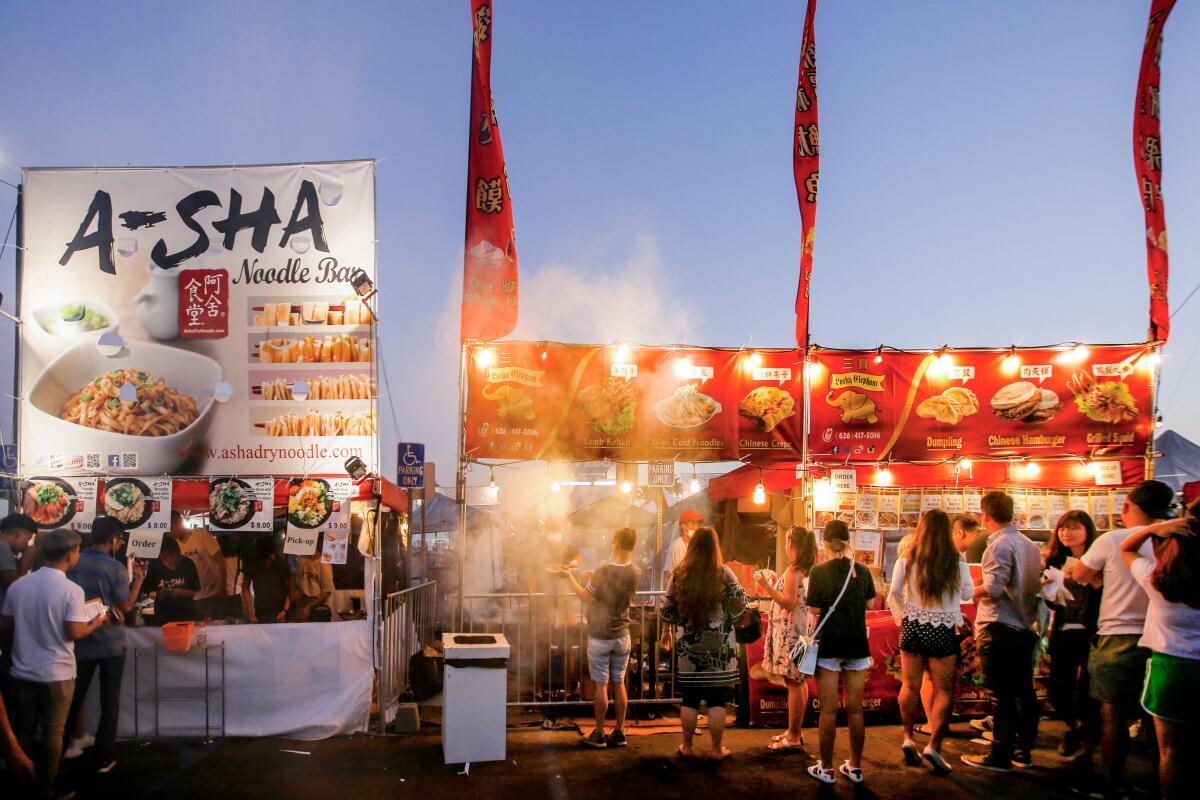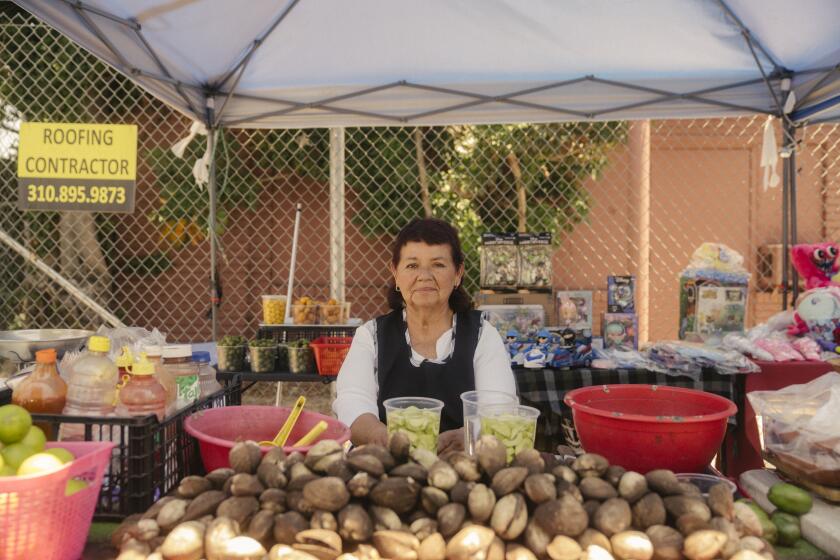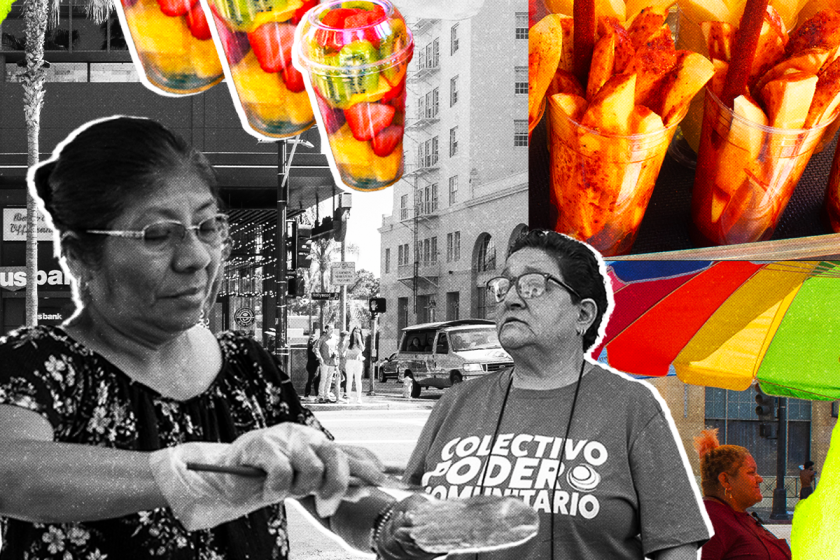Want a night market in your neighborhood? This new bill could make it easier to start one

- Share via
Standing at the future site of San Francisco’s Sunset Night Market, California Assemblymember Matthew Haney on Monday announced AB 441, a new bill he plans to introduce that’s intended to remove barriers and make it easier for California cities and neighborhoods to host everything from farmers markets and flea markets to night markets that take inspiration from the open-air food gatherings that are popular across Asia.
By streamlining permit processes and doing away with the bureaucratic hurdles that often burden community events, lawmakers hope that the new legislation could help revitalize city centers that are still struggling to recover from a loss of business during the pandemic.
With the end of the 2023 legislative session rapidly approaching, Haney, a Democrat from San Francisco, said he would introduce the bill with an urgency clause, meaning it would take effect immediately if the governor signs it into law. Because the bill has met little early opposition, Haney projects it will be signed as soon as February or March 2024 despite breaks in the session schedule.
“There is no reason why, at a time when we need to be supporting our small businesses [and] supporting people coming downtown into our neighborhoods, that we should have these bureaucratic hurdles that get in the way of us starting farmers markets and night markets,” said Haney.
Proponents of the bill, including celebrity chef Martin Yan and Theresa Tom, co-owner of the Mochi Donut in the Sunset District, hope these events can help revitalize the city’s economy.
“As I travel around the world, it doesn’t matter where I go — in Venice, in Berlin, in Rome, and all over Asia. In every single city you go to, the night market is thriving,” said Yan. “Not only is it a great idea for the community and the businesses surrounding it, but also for the people living here and across the entire city of San Francisco.”
San Francisco Supervisor Joel Engardio was inspired to seek state legislation following annual trips to Taipei with his husband, where the two would frequently visit night markets. During those travels, Engardio said he couldn’t help but imagine what the joy and bustle of food markets could do for his district and the entire state of California. Multiple night markets exist already in the L.A. area, including 805 Night Market in Thousand Oaks, MAMA’s Night Market in the Arts District, and 626 Night Market, which is the largest Asian food market in the country and is named after the San Gabriel Valley area code.
The longtime market on Vermont Avenue has returned after a difficult year, but can its vendors find a way to survive?
“People don’t just want a night market. They need it,” said Engardio. “A night market brings people together and make streets safer, and it gives small businesses a boost.”
After receiving a flood of public support in response to sharing the idea on his Twitter account, Engardio made it his mission to introduce a path to creating more night markets. When he initially ran into road blocks with San Francisco policymakers, Engardio enlisted Assemblymember Haney to help change the state laws that stood in the way of streamlining the permit process.
Currently, the California Department of Public Health does not have a specific permit for night markets and farmers markets. Existing legislation requires event organizers to reapply for a special events permit every few months. By creating a specialized permit with a yearlong lifespan, AB 441 would make it easier for these markets to get started and stay open.
Jenn Laurent, who organizes the Black Women Vend Night Market at Leimert Park, says it will take more than an extended permit to encourage new night markets and farmers markets to enter the scene. Harnessing her degree in paralegal studies, Laurent sifted through the many street vendor permits available to discover exactly what she needed to support the individual vendors at her market.
“We were guessing. We were assuming. We were operating off of partial information,” Laurent said.
In researching the proposed legislation, Haney’s office concluded that Los Angeles lawmakers have interpreted the current statutes relating to temporary food facilities differently than the rest of the state, and they do not require night market and farmer’s market organizers to re-apply for a permit with the city’s Health Department every 90 days.
“Our bill basically codifies what L.A. is already doing,” said Haney’s office in a statement.
At the height of the pandemic, most businesses were forced to alter operations, but for street vendors, who are subjected to zoning permits and rising food costs, things became even more unstable.
In Los Angeles and Southern California, where night markets are held year-round, barriers to entry typically center around individual vendors.
“That actual permit from the organizer is so minuscule,” said Jared Jue, founder of MAMA’s Night Market. “We have over 50 vendors each time we do our event, and each one of those vendors has individual costs that go through the Health Department.”
Every vendor must manually submit a temporary food-facility permit and proof of compliance with health and safety codes with the city’s Department of Public Health as well as a business tax registration certificate with the city’s Office of Finance. Jue says the process is so cumbersome that vendors have dropped out of the application process in the past.
During the news conference, community members expressed concerns about noise levels, parking and disruptions to nearby local businesses. Night markets in Southern California have faced similar struggles and in 2021, the popular Avenue 26 night market in Lincoln Heights was shut down by the city in response to resident complaints about difficulty parking, street blockages and safety concerns.
“These events are built for the community out of the community. So we are going to connect with the community and be very mindful of folks’ complaints,” Angie Pettit-Taylor, founder and director of Sunset Mercantile in San Francisco, reassured crowds at the news conference.
More to Read
Eat your way across L.A.
Get our weekly Tasting Notes newsletter for reviews, news and more.
You may occasionally receive promotional content from the Los Angeles Times.











